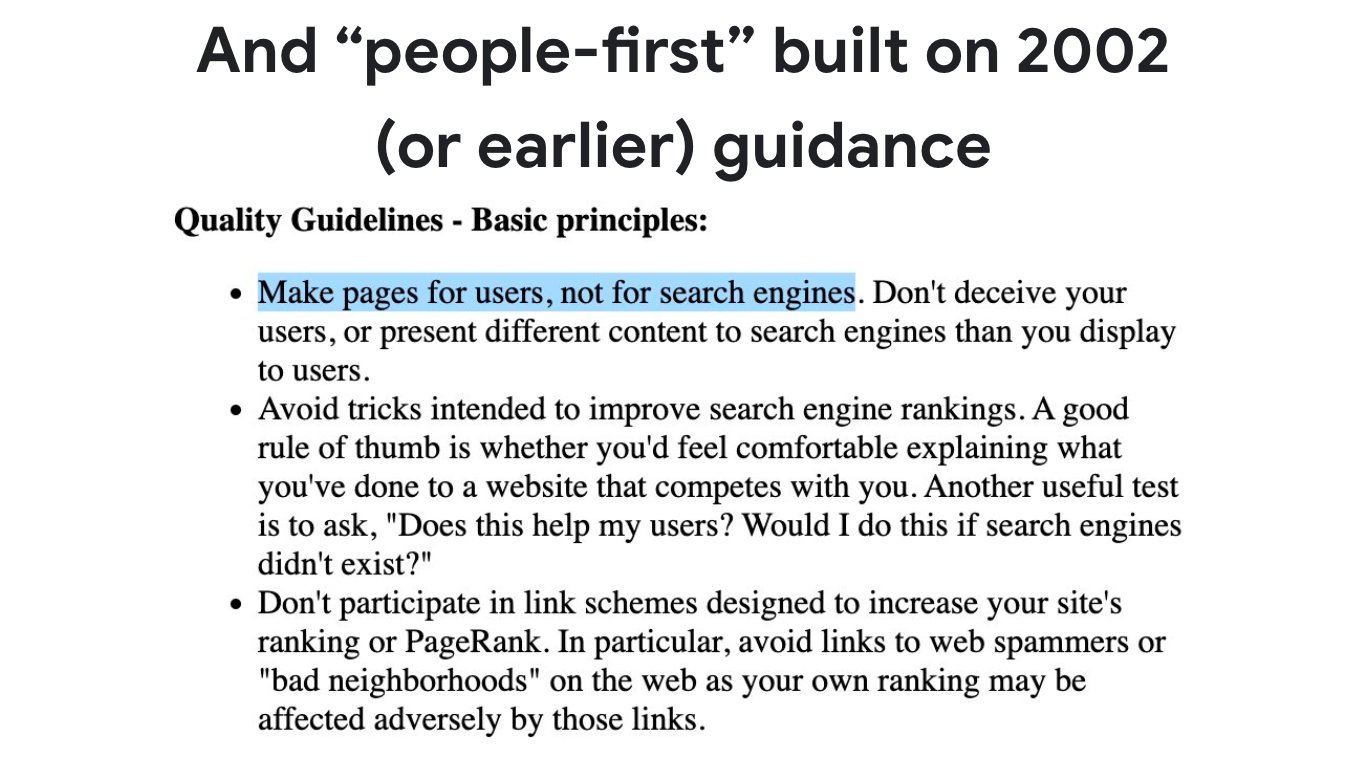The SEO industry was founded on a strong community of knowledge sharing between SEO pros; mostly about how to get top ranking on Google.
Tapping into this, Google realized that working ‘with’ the SEO industry was to its benefit, and thus a symbiotic relationship developed between Google and those who wanted to leverage its search engine.
This dance has fed an obsession with SEO professionals deconstructing every official word from Google, hoping to find the cheat code and shortcut to better ranking.
There is no doubt that, as an industry, we are fortunate to have so much information and communication online. But, with this comes a lot of conflicting advice about what is the best way to rank on Google.
For some, there is a belief that there is a formula of ranking factors, or a shortcut, which we discuss in our Ranking Factors article. In the article, we highlighted what areas are best to focus on for ranking on Google and a mindset moving away from formulas and towards what really matters.
What we did say is that instead of thinking there is a secret cheat code to ranking, everything that we need for success and visibility in Google search is widely available – from Google.
Just listen to what Google really wants.
It’s not complicated.
“Nothing with Google ranking – or in life in general – is that simple. If someone is telling you “this is what Google says to do,” are they making clear if it’s what we have said or if their interpretation?” Danny Sullivan.
Image from @searchliaison on Twitter, November 2023
The Core Guidance From Google Has Been Consistent For 20 Years
Google Search Liason Danny Sullivan posted a long X/Twitter thread that is one of the better insights into what Google wants and what is required for long-term success.
And what Google wants are timeless principles based on common sense.
In his X/Twitter thread, Danny started out by saying that Google is not perfect and it makes mistakes. He went on to say that:
“Some I’ve interacted with over the past few weeks believe our guidance about success with Google Search is new, that they now have to do something different. But for us at Google, that’s confusing, because it’s not new. It’s is based on years-old and even decades-old guidance.”
Image from @searchliaison on Twitter, November 2023
Most importantly, he also said that:
“Google’s long-standing advice of “Don’t do things for Google” is counter-intuitive to anyone who is trying to be successful with Google.”
 Image from @searchliaison on Twitter, November 2023
Image from @searchliaison on Twitter, November 2023At this point, we should all be leaning in and taking notes.
Spoiler alert: The secret of SEO and SERP visibility on Google is about building everything around the user.
The Secret To Visibility On Google
Google has remained the dominant search engine with a majority market share for over 20 years by having the best product on the market.
Google invests in constant iteration to keep improving its product. Its aim is to satisfy the user and provide the best result to the user’s query.
Everything that Google does is built on this fundamental motivation. And this has never changed.
To be clear, it is possible to rank on Google by ‘gaming’ the system at scale.
There are two types of SEO pros: those on a short-term gain of ranking and those building an online presence and serving their end user – long-term game.
Both types of SEO pros employ creativity and technical ability in different ways. However, a short-term gain only serves its purpose for what it’s intended – and that’s not to serve a user.
For anyone building a brand and a long-term presence online, an entirely different mindset and approach is needed. And to do this, you must work with Google, not against it.
It’s not that Google is asking for SEO professionals to be followers of Google.
Google simply wants a good experience for users, and this benefits everyone, especially the user. In return, this will deliver the best returns for a business.
What Google Wants Is Timeless Common Sense, UX, And CRO
In his X/Twitter thread, Danny went on to say that Google has been offering the same guidance for over 20 years, and that is to “Make pages for users, not for search engines.”
This is probably the best advice for anyone wanting to improve their online presence.
As said above, Google simply wants to surface content that is the best response to a query.
In classic SEO fashion, that depends on many factors. Queries can be transactional, navigational, or informational. Different niches have different requirements. There are even different intents for some plural versus singular keywords.
What underlines everything, is a need to understand the intent of the user and then to provide the best experience. Based on:
- How easily the page can be accessed.
- How directly the page answers the query.
- How comprehensively the page answers the query.
- How intuitively the page is structured.
This isn’t to say that if you ‘build a page, they will come.’ Domain/brand authority, topical relevance, user signals, and links all have an influence on ranking.
Not forgetting, with the advent of generative AI, being the source of information and offering quality is going to be even more important.
And this all circles back to what Google wanted to achieve with its original BackRub algorithm which was based on replicating the authoritativeness of academic papers through citations. Danny Sullivan explained:
“Does the content present information in a way that makes you want to trust it, such as clear sourcing, evidence of the expertise involved, background about the author or the site that publishes it, such as links to an author page or a sites About page?”
In his thread, Danny urged anyone to forget generalized advice and blanket approaches to SEO. Such as, “If you have an About page, you rank better!”
Because one thing we do know is that what is right for one brand or situation is not right for another.
There is no “one size fits all” approach to SEO and that is what makes it such an exciting and challenging space to work in.
Instead, think about what is a user’s motivation and make it as easy as possible for them to consume that information.
The areas that every SEO pro should be studying are usability (UX) and conversion (CRO). These are more aligned with what Google wants than anything else.
Build Your SEO Strategy Around What Is Fundamental
Once you understand that building lasting online visibility should be a combination of UX, content strategy, and technical SEO, you can start to build a robust and lasting SEO strategy.
If we look at E-E-A-T, this can be seen as the playbook that combines all of these things together.
And this underlines the people-first approach to “make pages for users, not for search engines.”
If you are managing the SEO for a brand, or building a long-term brand presence online, then this is the approach to best achieve lasting success.
Consider the recent Helpful Content System and then the announcement of New ways to find just what you need on Search. Both of these updates highlight Google’s move to surfacing content that has more experience and authority.
Not forgetting that with the introduction of AI and Search Generative Experience into search results, SEO is evolving rapidly.
It has always been Google’s desire to provide the very best answer to a user’s query, and machine learning and generative AI are the layers that keep refining.
With all these evolutions, SERPs are becoming more and more personalized.
Google views signals that represent user intent satisfaction as the way to provide better results.
Again, this circles back to usability and putting the user at the forefront of SEO strategy – invest in what users want to get the clicks. Google Search Central documentation states:
“The helpful content system aims to better reward content where visitors feel they’ve had a satisfying experience, while content that doesn’t meet a visitor’s expectations won’t perform as well.
The system generates a site-wide signal that we consider among many other signals for use in Google Search (which includes Discover). The system automatically identifies content that seems to have little value, low-added value or is otherwise not particularly helpful to people.”
Google is guarded about how its algorithm and systems work for a good reason: it is protecting its product.
If Google came out and said, “Do this, then that,” its search results pages would be spammed so heavily that the results would be full of garbage.
However, Google has also tried to find a balance of offering advice on how to create a better web with better information.
Matt Cutts, John Mueller, Gary Illyes, and Danny Sullivan all have the difficult role of having their every word dissected and misquoted beyond sense. But, they have all offered great advice which ultimately underlines a better World Wide Web.
To take away from what Danny Sullivan said about what Google wants: Move away from a mindset of ranking and move towards a mindset of user satisfaction.
Google wants the best results for a query. It’s all just common sense. But it is hard to do well.
Think like Google and put the user front and center of everything you do.
More resources:
- 5 Proven Ways to Increase Your Google Rankings
- Google PageRank Explained for SEO Beginners
- Ranking Factors 2023: Systems, Signals, and Page Experience
Featured Image: BestForBest/Shutterstock




